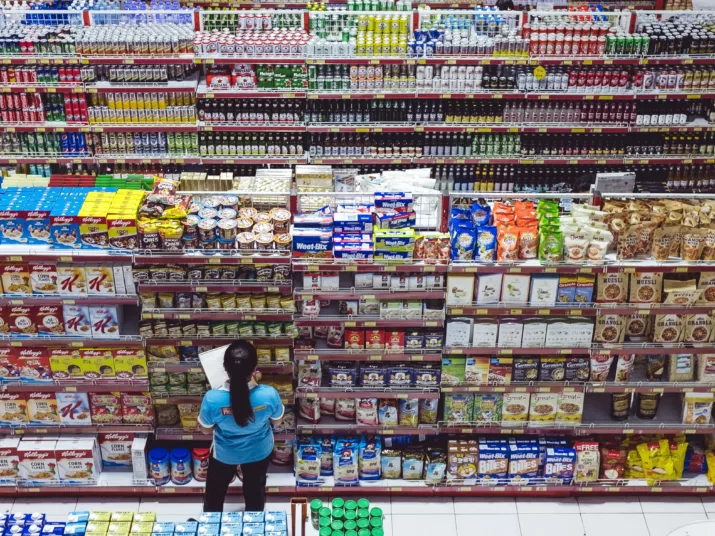
Photo: Bernard Hermant / Unsplash
THINKING SPACE HUMAN
WHY WE CONSUME
Six reasons for our society’s hunger for consumption.

Photo: Bernard Hermant / Unsplash
1) POLICY
More consumption means more economic growth – and in most economies, economic growth is one of the main political goals. It is measured by the gross domestic product (GDP). The target is a GDP growth of more than two per cent per year. Because in the competition between states, growth is considered a criterion of a country’s position of power. The more growth a state generates, the more powerful it appears in international comparison. However, it is not only in terms of foreign policy that the highest possible growth is important; it is also useful in the domestic context, because it is supposed to create jobs and thereby contribute to the satisfaction of the citizens. If growth were to fail to materialise in the long term, jobs could be lost, the state’s social security funds would be put under greater strain, and policymakers would be forced to address the controversial issue of a change in the distribution of wealth between rich and poor.
2) COMPANIES
Almost all companies want to make profits. In doing so, they are exposed to fierce competition. Most companies simply have to grow in order to maintain their position in the market. “Without a constant increase in labour productivity, the profits sought by capitalists are ultimately not realisable,” sociologist Klaus Dörre determines. The scientists Oliver Richters and Andreas Siemoneit have also found that in most cases the decision to choose between growth and non-growth is not free, but made rather according to a particular system and oriented massively towards investment and, as a result, growth.
3) SOCIETY
It is not only companies and states that constantly compete with each other – the same is true for us humans: we compare ourselves with our fellows and want to be better than others. A sense of competition and social pressure arises. This influences our consumption decisions: we then engage in “status consumption”, that is, buying things that are meant to communicate our status to the outside world – cars, smartphones or designer brand clothing, for example. Economist Professor Reinhard Loske notes: “In societies with large income disparities, the pressure to grow is much higher because the orientation [...] is always directed towards the ‘upper echelon’.” [1] But even when we have all these things, we still buy more. The standards for what we perceive as “normal” shift with the increase in our wealth – be it from one generation to the next or within a lifetime.
4) MONEY SYSTEM
The financial sector is based on constant growth and rising consumption – because this is precisely what is needed to be able to maintain the current monetary and interest-rate system. Each time someone borrows money from a bank, they have to pay interest on it. In order for borrowers to be able to make these interest payments to the bank, they must first earn them and as a consequence need to acquire more money than before they took out the loans in the first place. This can only function through growth.
5) PROGRESS
Improved technologies and processes allow more and more products to be manufactured in a shorter time. In addition, if the raw materials for production are available at low prices, the goods can be offered cheaply. As a result, consumption grows. Several scholars have already pointed out the connection between technological progress, cheap resources and economic growth, but the issue has not yet been studied in detail.
6) EVERYDAY LIFE
We all have our routines: we always like to drink the same coffee in the morning, buy the same detergent, take the same route to work – nothing changes. However, consumption is firmly anchored in these routines and the latter are mostly determined by the idea of “more and more”. We are wired to believe that growth is necessary and synonymous with success, wealth, security and progress. Even if we want to break these habits, we often run into hurdles in our daily lives that entice us back into more consumption. Lower taxes, for instance, often make travelling by plane cheaper than the more eco-friendly journey by train. Or if we find no bus or train stop right in front of our eyes, we simply go off and buy a car for our daily journeys.